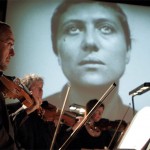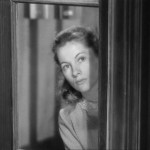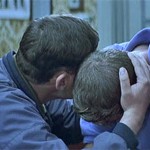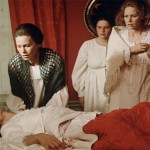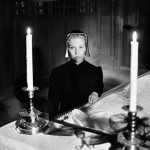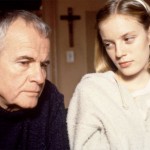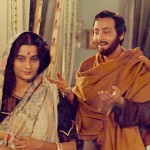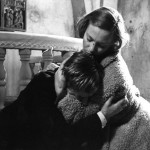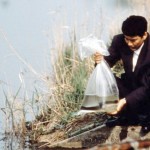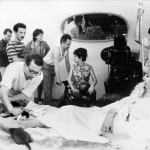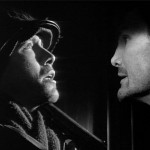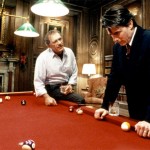By Herman Melville
Note: The following was written for a graduate seminar on the American Renaissance. It is an attempt to apply theories of cinema narrative to prose fiction.
“That First Comprehensive Glance”: The Cinematic Suspense of Benito Cereno
But that first comprehensive glance . . . rested but an instant upon them.
— from Benito Cereno
Once the body had been rendered immobile and attention had become focused upon the face or gaze, the law, desire and perversion made their way into the cinema.
— Pascal Bonitzer (18)
Abstract
With the impressive body of literary scholarship generated by Formalist analysis and modern narratological studies at our disposal, the idea of applying film narrative theory to literature — particularly to a story like “Benito Cereno,” written forty years before Thomas Edison first screened moving pictures for an American audience — might seem unfounded at best. The influence of the cinema on artists of the twentieth century has been obvious and well-documented, but, as Mike Frank has recently asked, “What might narratology look like if we were to take cinema — particularly ‘classical Hollywood cinema’ — as the paradigmatic instance of storytelling?” [1] In the strange, and often contentious, case of “Benito Cereno,” film theory offers, I will argue, the ideal framework and vocabulary for explaining exactly how Melville’s narrative functions. Mine is only the latest in the long line of such inquiries, but it will reveal that — as has often been the case for readers trapped in “Benito Cereno”‘s world — previous scholars, hoping for answers, have been forced to look in the wrong direction.
Survey of Scholarship
In September 1856, a reviewer for Knickerbocker described “Benito Cereno” as “painfully interesting,” concluding: “in reading it we became nervously anxious for the solution of the mystery it involves.” This sentiment is echoed by many of Melville’s contemporary reviewers, who frequently characterize The Piazza Tales as an enjoyable read and as a welcomed return to form after the “unfortunate” and “morbid” appearance of Pierre. [2] The appeal of “Benito Cereno” can be attributed largely to its much-discussed narrative structure, one that implicates the reader in its mysteries, forcing a suspense-filled and continuous process of mis- and re-interpretation. The form of “Benito Cereno” is, in fact, uniquely and inextricably bound to its content. In a story about ambiguously shifting perceptions, the manner by which we view the action is as significant as the action itself. Critics, both formalists and nonformalists alike, have been universally intrigued by Melville’s precise manipulation of point of view, an interest piqued, no doubt, by the obvious fallibility of its “center of perception,” Amaso Delano, and by the text’s unusual moments of objective narration (Seelye 104). While much of “Benito Cereno” is viewed only as it is reflected through the unreliable and subjective gaze of the American captain, an objective narrator does occasionally intrude upon the narrative, revealing its self-reflexive frame: we are told that the text we are reading is, in fact, some unknown third party’s written narrative and that the events depicted within have been confused by memory, told “retrospectively,” and “irregularly given” (255). That “Benito Cereno” ends with an elided legal transcript — which ostensibly, at least, is intended to reveal the “whole truth” — has been of little comfort to those attempting to systematize Melville’s narrative strategy.
Melville challenges astute readers of “Benito Cereno” to question the reliability of its sources from the opening paragraphs. In what is perhaps the story’s most often-cited passage, Captain Delano is described as:
a person of a singularly undistrustful good nature, not liable, except on extraordinary and repeated incentives, and hardly then, to indulge in personal alarms, any way involving the imputation of malign evil in man. Whether, in view of what humanity is capable, such a trait implies, along with a benevolent heart, more than ordinary quickness and accuracy of intellectual perception, may be left to the wise to determine. (162)
In the century and a half that have passed since the original publication of “Benito Cereno,” “the wise” have consistently judged Delano’s quickness and perception to be far less than ordinary. While some consensus has been reached concerning Delano’s role in Melville’s narrative structure — he is generally described as an “unreliable narrator” whose misperceptions drip with irony — critics have struggled to develop a vocabulary capable of explaining exactly how Delano’s point of view interacts with other narrative voices in the story.
In one of the earliest formalist readings of “Benito Cereno,” “The Shorter Fiction of Herman Melville” (1953), Charles Hoffman accounts for only two of the story’s narrative voices: Delano’s subjective point of view and the objective trial deposition that follows. Hoffman praises the former in Aristotelian terms, claiming, “for dramatic intensity, concentrated action, and structural unity, no better choice could have been made” (426). Delano serves, for Hoffman, as the reader’s surrogate, the “innocent eye” who must make sense of the ambiguous impressions made upon him. This reading echoes through much of the scholarship that has followed. [3]Interestingly, Hoffman describes Delano as “brave and resourceful,” a misinterpretation symptomatic of a highly problematic article. Along with his failure to mention the story’s other narrative voice(s) in any terms, Hoffman skims too quickly over the deposition, calling it a simple rehash of the actual Delano’s original document, an attempt to “gain in verisimilitude,” and an aesthetic failure. “Melville,” he writes, “did not choose or else did not know how to make use of Delano’s point of view as an observer to reveal enough of the mystery so that he might dispense with the cumbersome method of the document” (428).
Guy Cardwell rejects Hoffman’s overly-simplified reading, claiming that “Benito Cereno” is, ultimately, morally ambiguous, and that the complexity of Melville’s narrative is central to that ambiguity. In “Melville’s Gray Story” (1959), Cardwell criticizes those who have reduced “Benito Cereno” to the level of simple detective story, as if it were “a kind of television melodrama that divides its characters into unequivocally good guys and bad guys” (165). Instead, he sees the world of “Benito Cereno” as one where “optimism and despair are mixed in normal proportions” (164). Cardwell claims that Melville helps us toward this interpretation by “going behind” his characters on two (and only two) specific occasions: the first in the oft-cited description of Delano quoted above; the second just prior to the shaving scene, when Cereno’s assumed affection for Babo is compared to that of Johnson and Byron for their servants. While strangely focused on only two scenes, Cardwell’s discussion is the first to seriously consider a third narrative voice in the story. The consequence, he argues, is the temporary transport of the reader outside of the story, a jarring moment that forces the reader through irony to confront the moral implications of the events he or she is witnessing. “Captain Delano, then,” Cardwell writes, “is not simply the obtuse observer, a detective-story character who watches the plot unfold. He is in a serious sense the perceiving center, . . . With Delano as our guide we see that the world is not neatly dichotomized, does not fall neatly into a simple Manichean dualism” (164). For Cardwell, the deposition serves a similar purpose, pulling us out of a suspense-filled mystery and grounding us in the “real world,” where slavery, xenophobia, and economics are moral issues too complex to be described in black and white terms.
Cardwell’s differentiation between Delano, as the “perceiving center,” and a separate narrative voice that is able to “go behind” characters is further developed by John Douglas Seelye in Melville: The Ironic Diagram (1970). Echoing earlier scholars, Seelye calls Delano “well-meaning but obtuse,” but then shifts his focus to the narrative voice who is actually directing our reading (104) [4]. “As in ‘Bartleby, the Scrivener,’” Seelye writes:
the center of perception is inadequate, a seafaring version of the lawyer, but here detached from point of view by a delicate operation that allows a third “person” to interpose his wry perspective, shaping Delano’s simple optimism into a vehicle of facetiousness. We see things through the American’s eyes, but as through spectacles whose rose tints seem somehow discomforting. (104)
By attributing human characteristics to this “third person” — he is “wry” and able to “shape” our understanding of events — Seelye raises an important question: if the “third person” is deliberately manipulating our perception, then what is his motivation for doing so? [5]
In Melville’s Short Fiction: 1853-1856 (1977), William B. Dillingham ascribes similar agency to Seelye’s “third person.” Dillingham intends to correct the “common misconception” that “Benito Cereno” is told from only two narrative perspectives, and does so by identifying four distinct voices, which he labels the official, the individual, the authorial, and the reportorial (243). The “official” voice is that of the deposition section, which serves as the “legal stamp” that officially settles the affair. However, like Cardwell, Dillingham identifies Melville’s rhetorical use of irony here, claiming that he “transforms the deposition [into] . . . a commentary on the vanity and foolishness of ordinary mankind who cannot see or will not see the sameness of all”(244). The “individual” voice is Delano’s, distinguished from the others by its literalness and by its simplistic figures of speech. According to Dillingham, because Delano is blunt-thinking and incapable of irony, his perception is likewise limited, provoking juvenile similes like his description of the negresses as “unsophisticated as leopardesses; loving as doves” (198). Dillingham’s is a subtle, but important, distinction, as it necessarily attributes all of “Benito Cereno”‘s complex metaphoric language to the “authorial” voice. “Its style,” Dillingham writes, “is a metaphor for its message. . . . Melville depicts what Delano sees, but the terms of that depiction, that is, the figures of speech that make the correspondences necessary for the idea of similitude, are usually not Delano’s” (244-45). Instead, the story’s trademark irony — which deliberately targets Delano and, therefore, could not represent his own point of view — is clearly “authorial.” Finally, Dillingham identifies a fourth narrative voice, the “reportorial,” which is distinguished from the “authorial” by its neutral tone and informational function. Dillingham cites the story’s opening paragraph as an example of the “reportorial” voice: “It embodies no worldview or any character’s viewpoint. It furnishes facts and is nonevaluative” (243). Dillingham’s struggle to find (or, in fact, to create) a vocabulary for explaining Melville’s narrative strategy is obviously by no means unique. It is also far from effective, leading him to unnecessarily divide one voice — the narrator’s — into two, the “authorial” and “reportorial.”
A New Vocabulary
In my summary of existing scholarship I have intentionally remained faithful to the original authors’ language, a decision that has left this paper littered with sixteen different terms all used to describe the same thing. [6] I would like now to propose a terminology that will hopefully provide both a much-needed clarity and consistency and a better-suited entrance into film narrative theory. In forming this vocabulary I have relied heavily upon Seymour Chatman’s Coming to Terms, a book that builds upon Wayne Booth’s and David Bordwell’s work by examining side-by-side the rhetoric of narrative in fiction and film.
Chatman would simply use the term narrator to describe Cardwell’s “voice that goes behind,” Seelye’s “third person,” and Dillingham’s “authorial” and “reportorial” voices. For Chatman, the most important distinction is between those within and those outside of the story world, those able to see the action and those able only to narrate it. “The narrator’s task,” Chatman writes, “is not to go strolling with the characters but to narrate what happens to them, whether by telling or showing” (120). Therefore, the narrator of “Benito Cereno” is that unidentified person who has constructed the tale from outside of the story world, who comments ironically on Delano’s “undistrustful good nature,” and who admittedly elides the deposition.
Because of his distinction between the characters within the story world and the narrator who “tells” or “shows” them, Chatman finds fault with the overused term “point of view.” The very term implies seeing, an act from which the narrator is necessarily excluded because of his/her/its location outside of the story. Instead, Chatman proposes a terminological distinction between the narrator’s and a character’s “points of view.” Slant, for Chatman, captures the “psychological, sociological, and ideological ramifications of the narrator’s attitudes, which may range from neutral to highly charged” (143). Much recent study of “Benito Cereno,” then, has been concerned with uncovering those ramifications as they are revealed by the narrator’s slant. Why, for instance, does the narrator elide the deposition, thereby further silencing Babo? To describe a character’s “point of view,” Chatman settles on filter, a term that captures:
something of the mediating function of a character’s consciousness-perception, cognition, emotion, reverie-as events are experienced from a space within the story world. . . . [Slant] catches the nuance of the choice made by the implied author about which among the character’s imaginable experiences would best enhance the narration-which areas of the story world the implied author wants to illuminate and which to keep obscure. (144)
Filter seems a particularly appropriate term for describing Delano’s role in the narrative, as much of the story’s action is “filtered” through the lens of his gaze for obvious dramatic and ironic effect. This metaphor will be examined more closely in the final section of the paper.
Finally, Chatman makes a useful distinction between the unreliable narrator — a term that for decades has been used interchangeably to describe the problematic “points of view” of both the narrator and characters — and the fallible filter, Chatman’s own term for “a character’s perceptions and conceptions of the story events, the traits of the other characters, and so on.” Unreliable narrator, then, is used only to describe those instances when the narration itself is problematic, “since the word presupposes that there somewhere exists a ‘reliable’ account” (149). Whereas fallible filter describes a character’s “inaccurate, misled, or self-serving perception” (150). For Chatman, “fallible” is a term preferable to “unreliable” because it attributes less culpability to the characters. Captain Delano, after all, does not ask to be a “perceiving center.” He is merely living the story, not representing it.
Film Narrative and Cinematic Suspense
The distinctions made above, though subtle, are absolutely vital for explaining the workings of “Benito Cereno,” a story that relies not only on a famously fallible filter, but also on a deceptively unreliable narrator. Simply fixing a single terminology and doing nothing more, however, does little but provide some much-needed clarity and consistency to the discussion (or add more unnecessary jargon to the pile, depending on your opinion). The real value of Chatman’s work (and hopefully, by association, this paper) can be found, instead, in its analysis of the interrelations that exist between fiction and film narrative. In the case of “Benito Cereno,” it is Chatman’s discussion of the latter that, in fact, best explains Melville’s strategy.
In the early chapters of Coming to Terms, Chatman differentiates between Narrative, Argument, and Description, examining closely how each interacts with the other. To Chatman, Description is the most interesting of the “other text-types” because of the complexity of its relation to Narrative. As Gérard Genette writes, “description might be conceived independently of narration, but in fact it is never found in a so to speak free state. . . . Description is quite naturally ancilla narrationis, the ever-necessary, ever-submissive, never-emancipated slave” (qtd. in Chatman 18). In classical Hollywood cinema, Description and Narrative interact in a different, though no less complex manner. [7] To aid in the discussion, Chatman differentiates between explicit and tacit Description, and offers a scene from Touch of Evil as an example. Detective Quinlan’s first appearance has been described in the published cutting continuity as:
Very low angle M[edium]S[hot] of Quinlan slowly thrusting open the car door: a grossly corpulent figure in an overcoat, a huge cigar in the middle of his puffy face. (qtd. in Chatman 43)
Here, in this prose description, the compound adjective “grossly corpulent” explicitly describes Quinlan, fixing a particular trait on him. As readers, we are left with little choice but to imagine him as explicitly “corpulent,” as opposed to “obese,” “heavy,” or only “slightly overweight.” In Touch of Evil, however, Quinlan is described tacitly: we see him thrust open the car door, but our focus is directed toward his actions, rather than his appearance. As Chatman writes, “The film shows only features; it is up to the audience to interpret them — that is, to assign them adjectival names” (43). To Chatman, the cinematic description could only be called explicit if Welles then cut to an extreme close-up of the folds of fat in Quinlan’s face. Even then, though, each viewer would still decide on his or her own if Quinlan were “grossly corpulent” or merely stout. The result, then, is an unavoidable ambiguity in cinematic Description. “Only words,” Chatman writes, “can fix descriptions conclusively” (44).
That last statement, however, is repeatedly called into question by “Benito Cereno,” a story that consistently frustrates readers by its absolute refusal — excepting a few notable instances — to fix descriptions conclusively. Seelye was one of the first, for instance, to notice how precisely Melville uses diction to obscure description, pointing to the 115 conjectural expressions — ambivalent uses of words like seem, appear, perhaps, possibly, evidently, might, presume, conjecture, imputed, and thought — that appear in the story’s 97 pages. [8] “These phrases, instruments of style,” writes Seelye, “reflect the lamination of false appearances and unanswerable paradoxes that confound perception and inquiry, a fiction in which things are never as the ‘seem’” (105). A similar observation is made by Nancy Roundy in “Present Shadows: Epistemology in Melville’s ‘Benito Cereno.’” Roundy notes how the world of “Benito Cereno” becomes blurred by the story’s abundant use of metaphoric language. “A metaphor does not assert that something is,” she writes, “but only that it is like some other thing. Sharp boundaries, certainties, disappear and we are in a world of appearances” (347).
Another method used by Melville to avoid fixing descriptions conclusively is the double negative, a sentence construction that describes what something is not, thereby forcing the reader to assign his or her own unique adjectival name to that thing that is being described. Examples of this practice occur with astounding regularity throughout the first two-thirds of the story, most notably in the narrator’s description of Delano’s “undistrustful good nature, [he was] not liable . . . to indulge in personal alarms.” But a particularly impressive display of double negatives describes (or, does not describe) Delano’s first impressions of Benito Cereno and Babo:
But the good conduct of Babo, hardly more than the ill-behaviour of others, seemed to withdraw the half-lunatic Don Benito from his cloudy languor. Not that such precisely was the impression made by the Spaniard on the mind of his visitor. The Spaniard’s individual unrest was, for the present, but noted as a conspicuous feature in the ship’s general affliction. Still, Captain Delano was not a little concerned at what he could not help taking for the time to be Don Benito’s unfriendly indifference toward himself. The Spaniard’s manner, too, conveyed a sort of sour and gloomy disdain, which he seemed at no pains to disguise [my italics]. (169-70)
That second sentence, in particular, deliberately resists fixing an explicit description on the scene, showing us only the precise impression that was not made on our filter. From the opening of “Benito Cereno” until the point when the scales drop from Delano’s eyes, the word “not” is used more than 170 times. In nearly half of those instances, it is used in a double-negative construction, such as, “not unlike,” “not unwilling,” or “not uncharacteristic.” [9]
The cumulative effect of Melville”s diction is, as Roundy says, the creation of a “world of appearances.” But it’s a world where even appearance is blurred, a world almost completely devoid of explicit description. Chatman’s discussion of film description again offers an appropriate analogy: as with the diction of “Benito Cereno,” “Film gives us plenitude without specificity. Its descriptive offerings are at once visually rich and verbally impoverished” (39). Like film viewers forced to ascribe particular adjectival descriptions to Detective Quinlan, readers of “Benito Cereno” must actively create its story world with only confounding images as cues.
But “Benito Cereno” is not completely free of explicit description. Several scholars have pointed to the story’s opening paragraphs as the work of an omniscient narrator who grounds the reader in a world of fact. [10] The narrator returns occasionally to this non-evaluative, non-ironic tone, notably in his description of the cuddy in the opening paragraphs of the shaving scene, and in those moments when we are shown things — such as the two black men who stare intently at Delano — that are “unperceived by the American” (224). There are countless examples of an equivalent narrative voice in film. The opening establishing shots of several Hitchcock films — Rear Window and Psycho, in particular — are frequently cited by narratologists, including Chatman. Rear Window, for instance, opens with a shot of window blinds being raised, followed by several complex extreme long shots, as the camera moves through the window and “randomly” examines the daily activities of the neighborhood. As Chatman notes, were the film to continue in this manner, it might be mistaken for a documentary on city life (46). We as viewers accept this nonhuman agent, this camera, and trust it in much the same way that we trust the narrator of “Benito Cereno.” Just as we believe that Rear Window begins on a hot (94 degrees according to a close-up of a thermometer) morning (we see the composer shaving, the childless couple waking to the sound of an alarm clock), we trust that “Benito Cereno” begins in 1799 and that Delano is from Duxbury, Massachusetts.
But while many have examined the slant of “Benito Cereno”‘s narrator, few have questioned his reliability much beyond brief mentions of his “retrospective” and “irregularly given” narrating of the story. However, in one passage that has been conspicuously overlooked by previous scholars, the narrator, making manipulative use of his established credibility, deliberately deceives us. In the opening pages of “Benito Cereno,” Delano stands with Cereno and Babo, listening to the Spanish captain tell of his harrowing voyage. Overcome by coughing fits, Cereno has difficulty recounting his tale. Finally, the narrator steps in: “as this portion of the story was very brokenly delivered, the substance only will here be set down” (174). What follows is a long (321 words) paragraph written in the objective, nonironic style of the story’s opening paragraphs. While the passage is clearly marked as Cereno’s telling, the effect of the shift in diction and tone is unmistakable. Already immersed in a world of shifting visions and “modified” appearances, readers cling for stability to the explicit descriptions of the trusted narrator.
At the time of the publication of Coming to Terms, Chatman had only one famous example with which to illustrate unreliable narration in film. [11] It serves, however, as a helpful analogy to the deceptive shift of tone in “Benito Cereno.” Stage Fright (1950) is another of Hitchcock’s experiments with suspense and cinematic narrative, a film in which the supposedly objective camera serves complicity in the crime. Stage Fright opens as Johnny and Eve speed to Eve’s father’s house. Johnny is telling Eve of his discovery of a murder committed by his lover, Charlotte. “I had to help her,” Johnny says. “Anybody would.” As he begins narrating his story to Eve, the frame dissolves into a “lying flashback,” in which we are shown Johnny’s version of what “really” happened. It is only later, when we learn of his criminal tendencies, that we begin to doubt Johnny’s story. What makes Stage Fright unique is that for the first half of the film, we are given absolutely no reason to question the validity of what the narrator is showing us. As film-goers, we have learned to accept the camera’s rendering of the world as truth, as if it were a binding contract. However, as in “Benito Cereno,” the narrator of Stage Fright has deliberately broken that contract, manipulating our trust for dramatic effect. Again, Chatman’s insights into film are suitably applicable to “Benito Cereno”: when the story’s narrator takes over from Cereno in the telling of his tale, “seeing is precisely not believing” (131).
In “Benito Cereno,” however, it is not only the narrator who misleads us, a fact that has hardly gone unnoticed. Delano’s fallibility as a filter, as I’ve already shown, is the focus of many of the early analyses of the story. But the existing literature does little more than name Delano’s “unreliability” as such. It is in explaining Melville’s use of perceptual subjectivity that film theory offers its most useful insight into “Benito Cereno.” For while the filter in film still emerges from the perceptual consciousness of a character (as in prose), it does so using different methods, most notably the eyeline match and close-up. Rear Window again serves as a classic (and well-worn) example. After surveying the courtyard outside of the window, the camera then tracks back, revealing the film’s protagonist, Jimmy Stewart’s L. B. Jeffries. He is, we assume, asleep: he is lying, with eyes closed, in a wheelchair, one leg elevated in a hard cast. Hitchcock then elides time by fading-in to a medium shot of Jeffries, who is now sitting up and reaching to answer a telephone. As he speaks to a friend, Jeffries lifts his gaze from the phone to something out of frame, presumably to something behind the camera. Hitchcock then cuts, in an eyeline match, to the familiar long shot of the courtyard. [12] Now, however, it is Jeffries’s view of his neighbors that we see. Now, it is Jeffries who is watching Miss Torso stretch and the sun-bathers disrobe, not the objective narrator.
The impact of the eyeline match has been of interest to filmmakers and film theorists since D. W. Griffith first began to experiment with the use of close-ups in his early shorts. Soviet filmmakers of the late-1910s pushed the technique even further in their explorations of the emotional impact of montage. Hitchcock, in an interview with Francois Truffaut, described the most famous of the Soviet experiments— that conducted by Kuleshov — and its impact on his own filmmaking:
You see a close-up of the Russian actor Ivan Mosjoukine. This is followed immediately by a shot of a dead baby. Back to Mosjoukine again and you read compassion on his face. Then you take away the dead baby and you show a plate of soup, and now, when you go back to Mosjoukine, he looks hungry. Yet, in both cases, they used the same shot of the actor; his face was exactly the same.
In the same way, let’s take a close-up of Stewart looking out of the window at a little dog that’s being lowered in a basket. Back to Stewart, who has a kindly smile. But in the place of the little dog you show a half-naked girl exercising in front of her open window, and you go back to a smiling Stewart again, this time he’s seen as a dirty old man! (215-16)
This concept, long accepted in film theory, seems equally applicable to fiction, assuming that the text resists fixing conclusive descriptions. The above example would obviously fail if it were transcribed as, “Stewart looks at the half-naked girl with complete indifference.” But “Benito Cereno,” as I’ve already shown, does resist explicit description, and operates in a manner remarkably similar to a classical Hollywood suspense film. In “Hitchcockian Suspense,” Pascal Bonitzer writes, “The weight of death, murder and crime have meaning only though the proximity of a gaze. All Hitchcock has done in his films is to make the best possible use, where staging is concerned, of the function of the gaze laid bare by crime” (18). Just as Hitchcock filters our experience of Rear Window through Jeffries’s neutral gaze, so does Melville through Delano’s in “Benito Cereno.”
Again, the opening pages of the story are a fitting example. After the narrator establishes several facts in the first three paragraphs, the narration shifts to Delano’s filter with the first sentence of the fourth paragraph: “To Captain Delano’s surprise, the stranger, viewed through the glass, showed no colors [my italics]” (161). While the similarities between Delano’s “glass” and Jeffries’s binoculars and telephoto lens are interesting to mention in passing, the significance of the sentence lies in the verb, viewed. Melville’s method for establishing and maintaining his filter is atypical. He does not simply change the tone or syntax of the narration as Joyce does in Dubliners, nor does he create a stream-of-consciousness like Woolf or Faulkner. Instead, he quite cinematically “cuts” between close-ups of Delano’s frustratingly neutral face and the mysterious images that bombard him.
There is an almost limitless supply of examples with which to illustrate this point. Upon first seeing Cereno’s ship: “Captain Delano continued to watch her — a proceeding not much facilitated by the vapors partly mantling the hull, . . . It might have been but a deception of the vapors, but, the longer the stranger was watched the more singular appeared her manoeuvres [sic]” (162). Later, after being startled by something moving in the chains: “He rubbed his eyes, and looked hard” (200). Then, when he has become convinced of Cereno’s guilt: “Captain Delano glanced towards Don Benito. As he saw his meagre [sic] form in the act of recovering itself from reclining in the servant’s arms, . . . he could not but marvel at the panic by which himself had been surprised” (207).
It is in the shaving scene, though, that Melville’s cinematic narrative is best illustrated. The cuddy is first glimpsed through the nonironic, nonevaluative lens of the narrator. The diction is simple and relatively free from metaphoric language. “The floor of the cuddy was matted,” the narrator informs us. “Overhead, four or five old muskets were stuck into horizontal holes along the beams. On one side was a claw-footed old table lashed to the deck” (211). The description here is explicit: there are no conjectural expressions; seems and appears are replaced with was and were. The narrator simply shows us the room, “randomly” describing the setting like Hitchcock’s camera randomly describes a New York neighborhood.
In the first four paragraphs of the shaving scene, only once does the narrator’s tone shift. Two settees are described as “black with age, and uncomfortable to look at as inquisitors’ racks, with a large, misshapen arm-chair, which, furnished with a rude barber’s crotch at the back, working with a screw, seemed some grotesque engine of torment” (211). This isolated sentence draws our attention both by the menacing nature of the similes employed and by the return of conjectural verbs. Again, this shift can be explained in cinematic terms. Bonitzer borrows Gilles Deleuze’s term stain to describe the inexplicable element which creates disorder in an otherwise orderly, natural world. “Hitchcockian narrative,” Bonitzer writes:
obeys the law that the more a situation is somewhat a priori, familiar, or conventional, the more it is liable to become disturbing or uncanny, once one of its constituent elements begins to “turn against the wind”. . . . The staging and editing of the suspense serve to draw the audience’s attention to the perverse element. The film’s movement invariably proceeds from landscape to stain, from overall shot to close-up, and this movement invariably prepares the spectator for the event. (23)
And this is, in fact, exactly how the shaving scene operates. After describing the relatively natural furnishings of the cuddy (his familiarity with rooms like it put Delano “at ease”), the narrator draws our attention to the stain — the torturous-looking settees that will soon feature prominently in the story’s most suspense-filled scene. After moving from landscape to stain, the narrator then cuts to a close-up of Delano, reestablishing his fallible filter: “Glancing towards the hammock as he entered, . . .” (211). The remainder of the scene, including the racist meditation on slavery and the terrifying shaving itself, is filtered through the “familiarly and humorously” benign nature of the American (213). Thus, as in Hitchcock’s films, suspense is achieved in “Benito Cereno” through editing and staging, a process that is “sustained by the gaze, itself evoked by a third element, a perverse object or stain” (Bonitzer 28).
The penultimate instance of an eyeline match occurs at the emotional climax of “Benito Cereno,” when Delano finally realizes the tragic truth of the episode: “Captain Delano, now with scales dropped from his eyes, saw the negroes, not in misrule, not in tumult, not as if frantically concerned for Don Benito, but with mask torn away, flourishing hatchets and knives, in ferocious piratical revolt” (233). Until this point (only 72 pages), verbs synonymous with “to see” are used an astounding 244 times. [13] As Rohrberger has noted, Delano’s filter is necessary in order to fully involve the reader in the mystery of the story, but is quickly discarded once that mystery has been revealed. In the remainder of “Benito Cereno,” see verbs are used only four times: “there is no equivocation, no use of suggestive metaphor. Gone are the shadows and the vapors and the air of unreality” (545). Instead, the narrator’s objective slant returns to narrate the final events aboard the ships, to introduce and present the deposition, and to recount the final conversation between Delano and Cereno. [14]
In the final two paragraphs of “Benito Cereno,” Melville cuts, for the first time, to close-ups of Cereno and Babo. In the former case, he deliberately avoids establishing the character as a filter. We are given one final shot of Cereno, but refused entrance into his subjectivity. Cereno steadfastly refuses to “look” at Babo, even fainting when pressed by the judges to do so. However, the final “gaze” we appropriate is that of Babo’s decapitated head, “that hive of subtlety” (258). That “subtlety” is mirrored in the diction of the 84-word final sentence. Although it is through Babo’s lifeless eyes that we meet the “gaze of the whites” and look upon St. Bartholomew’s church, our vision is once again blurred, preventing us from finally and conclusively unveiling the mystery of ‘The negro.’”
— Presented at Florida State Film & Literature Conference
January, 2002
Footnotes
[1] From Frank’s call-for-papers for the Society for the Study of Narrative Literature, MLA Newsletter 32.1 (2000): 33. I realize that citing a call-for-papers is unorthodox, but Frank’s question has been very helpful as I’ve struggled to form my own position. [return]
[2] See Brian Higgins and Hershel Parker, eds., Herman Melville: The Contemporary Reviews, American Critical Archives 6 (New York: Cambridge UP, 1995). Criterion recommends The Piazza Tales for “a companion under the broad branches of an old elm in the hot summer days” (472). Churchman claims that The Piazza Tales “are destined to be read in many a pleasant country house, at watering-places, by the seashores, and among the mountains, during the coming summer heats” (475). And Transcripts predicts the collection will “be a favorite book at the watering places and in the rural districts this season” (476). Reviewers from both the Southern Literary Journal (472) and the Philadelphia Evening Bulletin (474) praise The Piazza Tales in comparison to Pierre. [return]
[3] See also Richard Harter Fogle, Melville’s Shorter Tales, (Norman: U of Oklahoma P, 1960). Fogle, like Hoffman, mentions only Delano’s point-of-view, which he describes as a “struggle to comprehend” (120), and the deposition. Fogle also echoes Hoffman’s praise of the opening section’s structure, which he calls “simply projected in the unities of time, place, and action”(122). [return]
[4] See also Robert Bruce Bickley, The Method of Melville’s Short Fiction (Durham: Duke UP, 1975). Bickley makes a similar distinction between Delano’s point-of-view and “a limited-omniscient narrator, one privileged to enter Delano’s mind alone, but also permitted to draw partially aside the masks that conceal the identities of Babo and Cereno” (101). [return]
[5] This question is obviously too large to be adequately addressed here. Recently, the focus of narratological studies of “Benito Cereno,” like that of much of Melville criticism, has turned to Post-Colonial and materialist readings. In “Narrative Self-Justification: Melville and Amasa Delano,” Studies in American Fiction 23:1 (1995): 35-53, Richard McLamore argues that both Melville’s and Amasa Delano’s narratives are constructed so as to deflect the “naïve” reader’s attention from the American captain’s economic motivations. McLamore claims that by transforming Delano’s travel narrative into a “fantastic pirate suspense-story” Melville is, in fact, covertly satirizing “Delano’s evasive, contradictory, and greedily hypocritical narrative” (40, 35). [return]
[6] point of view, center of perception, objective narration, subjective gaze, unreliable narrator, narrative voice, innocent eye, Melville’s narrative, going behind, perceiving center, third person, narrative perspective, the official, the individual, the reportorial, and the authorial. [return]
[7] Film does, however, offer the unique opportunity for Descriptive emancipation. Christian Metz, in Film Language: A Semiotics of the Cinema, trans. Michael Taylor (New York: Oxford university Press, 1974), offers the example of a landscape described by “a tree, followed by a shot of a stream running next to the tree, followed by a view of a hill in the distance” (127-28). Chatman responds, “The shot sequence forms a narrative pause. The sign of the pause is precisely the temporally unmotivated shifting from tree to stream to hill” (42). [return]
[8] See also Dillingham, 245, and Mary Rohrberger, “Point of View in ‘Benito Cereno’: Machinations and Deceptions,” College English 27 (1965), 544. [return]
[9] With this knowledge, the “knot” of the story takes on an even greater symbolic significance. Some form of “knot” or “knotter” appears 29 times in the same span of pages. [return]
[10] See Rohrberger, 542-43. She counts twenty-five facts in the story’s first eight sentences. [return]
[11] Along with the famous example of Robert Weine’s Cabinet of Dr. Caligari, Bryan Singer’s The Usual Suspects (1995) operates in a similar manner. Verbal Kint, we learn at the end of the film, is a fallible filter. But the camera has also served as an unreliable narrator, describing the lying flashback from a supposedly objective and trustworthy distance. [return]
[12] The eyeline match is one of five standard techniques in continuity editing of the classical Hollywood cinema. The others are the 180 degree rule, establishing shot/breakdown, shot/reverse shot, and match on action. See David Bordwell, Janet Staiger, and Kristin Thompson, The Classical Hollywood Cinema, (New York: Columbia University Press, 1985). [return]
[13] “Benito Cereno,” in this light, reads like a thesaurus: appear, eye, gaze, glance, glare, glimpse, image, impress, look, mark, notice, observe, peer, perceive, regard, remark, scrutinize, see, sight, spectacle, spy, stare, survey, turn, view, watch, witness. [return]
[14] Film theory might also offer a better explanation for the sudden drop of Delano’s filter and the shift to an objective slant. While the analogy is not perfect, it seems that the conclusion of Psycho operates in a very similar manner. When Lillian Crane discovers Mrs. Bates’ corpse in the fruit cellar and Norman emerges with the knife, the film suddenly drops Norman’s filter, as the mystery it has obscured has been suddenly revealed. The switch to the deposition in “Benito Cereno” is likewise similar to the psychiatrist’s analysis of Norman. See Christopher D. Morris, “Psycho’s Allegory of Seeing,” Literature Film Quarterly 24.1 (1996), 48. Finally, the return to Norman’s/Mother’s filter in the film’s final images mirrors the momentary return to subjectivity in the final paragraph of “Benito Cereno.” [return]
Works Cited
Bonitzer, Pascal. “Hitchcockian Suspense.” Everything You Always Wanted to Know about Lacan (But Were Afraid to Ask Hitchcock). Ed. Slavoj Zizek. London: Verso, 1992. 15-30.
Cardwell, Guy A. “Melville’s Gray Story.” Bucknell Review 8.3 (1959): 154-67.
Chatman, Syemour. Coming to Terms: The Rhetoric of Narrative in Fiction and Film. Ithaca: Cornell UP, 1990.
Dillingham, William B. Melville’s Short fiction: 1853-1856. Athens: U of Georgia P, 1977.
Hoffman, Charles G. “The Shorter Fiction of Herman Melville.” South Atlantic Quarterly 52 (1953): 414-30.
Melville, Herman. “Benito Cereno.” Billy Budd and Other Stories. New York, Penguin. 1986.
Rohrberger, Mary. “Point of View in ‘Benito Cereno’: Machinations and Deceptions.” College English 27 (1965): 541-46.
Roundy, Nancy. “Present Shadows: Epistemology in Melville’s ‘Benito Cereno.’” Arizona Quarterly 34 (1978): 344-50.
Seelye, John Douglas. Melville: The Ironic Diagram. Evanston, IL: Northwestern UP, 1970. 104-11.
Truffaut, Francois. Hitchcock. Rev. ed. New York: Simon & Schuster, 1985.

